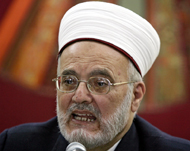Cemetery row hits tolerance museum
A senior Muslim cleric has asked Israel’s Supreme Court to stop construction of a museum dedicated to human rights and tolerance in Jerusalem after bones from an old Muslim cemetery were found during foundation work.

Shaikh Ikrima Sabri, the Grand Mufti of Jerusalem and the Palestinian territories, told Aljazeera.net on Thursday that the cemetery is of great historical value.
“It dates back to the era of the Second Muslim Caliph Umar bin al-Khattab in the seventh century,” Sabri said. “Several notable Muslim figures of that era are buried here. Soldiers who came with the Muslim army to fight the Romans are also burried here.
“We adhere to our legitimate right to protect the Maman Allah graveyard and all other Muslim cemeteries. This is the oldest Muslim graveyard in Palestine.”
The Palestinians accuse the Israeli police of ignoring a previous ruling and of siding with the museum’s officials.
“An Israeli court had ordered the Tolerance Museum constructions to be stopped, but they never yielded. We are taking the case higher now, to the Supreme Court,” Shaikh sabri told Aljazeera.net.
Court hearing
A spokesman for the Simon Wiesenthal Centre, an international Jewish human rights group behind the Museum of Tolerance, said the court would hear the appeal next week.
 |
|
Sabri wants the cemetery to be |
“The land was not a cemetery when we got it from city hall and the government and we are waiting to know the [court’s] decision,” Hagai Elias, said.
Sabri said the Israeli attacks on this “important Muslim sight” have been going for decades.
“Thanks to the satellite channels and the internet, our voice is being heard. Before that we suffered a lot from Israeli attacks on this cemetery and other Muslim symbols, especially because the cemetry is in western Jerusalem which is under full Israeli control,” he said.
Responding to Elias’s comments that there was no cemetery on the construction spot when the museum received it from the City Hall, Shaikh Sabri said: “If it was not a cemetery, then why did they ban anybody from reaching the construction site, including journalists? I my self was banned from approaching the site and talk to officials there.”
International historical site
Sabri said there are plans to ask the UNESCO to register the cemetery as an international historical site.
Muslim leaders say the parking lot on which the museum is planned is above remnants of a Muslim cemetery on land owned by the Muslim Waqf (endowment), and confiscated by Israel.
Sabri said many families from Jerusalem who have ancestors buried there are backing the case presented to the Israeli Supreme Court.
Arnold Schwarzenegger, the governor of California, unveiled a cornerstone of the museum in 2004.
The $150 million facility will promote “the vital need for tolerance in Israel and around the globe”, the Wiesenthal Centre said on its website.
Archaeological site
Osnat Goaz, a spokeswoman for the Israel Antiquities Authority, said: “The entire city of Jerusalem is built on an archaeological site and human remains are frequently discovered.”
|
“The entire city of Jerusalem is built on an archaeological site and human remains are frequently discovered” Osnat Goaz, |
The remains are often removed and reburied by religious authorities, she said.
Ultra-Orthodox Jews have in the past rioted to demand building plans be halted or road routes changed when workers have found human skeletons on land due for construction.
The Moriah Company for the Development of Jerusalem, which is excavating foundations on behalf of the Jerusalem Municipality before it gives the land to the Simon Wiesenthal Centre, said it would “abide by the Supreme Court’s decision”.